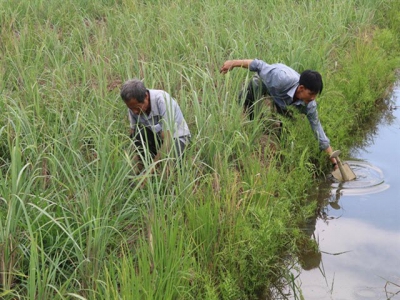Tiền Giang farmers rotate rice with other crops, improve income

TIỀN GIANG — Many rice farmers in the Mekong Delta province of Tiền Giang have rotated rice with other crops, resorted to intercropping or switched to other crops to improve their income, according to the province’s Department of Agriculture and Rural Development.
Farmers in Tiền Giang Province’s Tân Phú Đông District grow lemongrass. — VNA/VNS Photo Minh Trí
The other crops include vegetables, corn, cucumber and water melon.
Bùi Văn Tiếp, who plants two rice crops and one other crop on his 2.7ha field in Cai Lậy District’s Thạnh Lộc Commune, said he grows water melon since the fruit offers high yields and is easy to sell.
Growing only rice increases the risk of disease outbreaks and reduces soil fertility, he explained.
This model enables him to earn nearly VNĐ300 million (US$12,900) a year, two to three times the money he earns from growing only rice, he said.
The province has encouraged rice farmers in the eastern districts and Gò Công Town, which are severely affected by saltwater intrusion in the dry season, to rotate between rice and other crops or switch completely to the latter.
The eastern districts include Gò Công Đông, Gò Công Tây, Chợ Gạo and Tân Phú Đông.
Nguyễn Văn Hải, head of the Tân Phú Đông Agriculture and Rural Development Division, said local farmers have switched to growing lemongrass on more than 1,500ha of what were low-yield rice fields.
The fields, which used to yield only one rice crop in a year during the rainy season, now lend themselves to two or three lemongrass crops a year, making the district the province’s largest producer of the grass, he said.
It has improved farmers’ incomes, he said.
Lemongrass is considered one of Tân Phú Đông’s key crops since it grows well even in areas affected by saltwater. The islet district is often affected by drought and saltwater intrusion in the dry season.
To restructure agriculture in its eastern region, the province last year decided to provide financial support until 2020 to farmers there who rotate crops or intercrop.
Those growing two rice crops and one other crop, except corn, or switching completely to other crops like vegetables, fruits and grasses for breeding animals will be given a one-time subsidy of VNĐ3 million ($129) per hectare.
Those who plant only two rice crops a year and leave their fields fallow in autumn-winter will receive VNĐ2 million ($86) a year per hectare for three years.
The province’s Agriculture Extension Centre organises training in advanced techniques for farmers every year.
The province has established concentrated vegetable growing areas, with Châu Thành, Chợ Gạo and Gò Công Đông districts and Gò Công Town accounting for the largest areas.
Trần Văn Hòa, head of the Chợ Gạo District Agriculture and Rural Development Division, said there are large areas that grow vegetables, chili, corn and other crops.
The vegetables are supplied to the southern region, especially HCM City, he said.
The model of rotating crops in rice fields helps farmers in the province earn 3-4 times the amount of money they do from growing only rice, according to the department.
Farmers earn VNĐ31.8 million ($1,370) per hectare from corn, VNĐ85.2 million ($3,660) from water melon and VNĐ45 million ($1,940) from vegetables.
Có thể bạn quan tâm
 Vietnam studies unmanned helicopters for agriculture
Vietnam studies unmanned helicopters for agriculture The task facilitates learning foreign experiences and techniques, and improve the capacity of Vietnamese researchers and trainers.
 Vietnam's cassava industry faces big hurdles
Vietnam's cassava industry faces big hurdles Fresh cassava after harvest. Cassava processors face difficulties like shortage of raw materials and trade barriers in China, their largest export market.
 Mekong Delta aims for high-quality agriculture in 2019
Mekong Delta aims for high-quality agriculture in 2019 Localities in the Mekong Delta have set ambitious targets this year with a focus on high-quality agriculture combined with eco-tourism, services and industry.